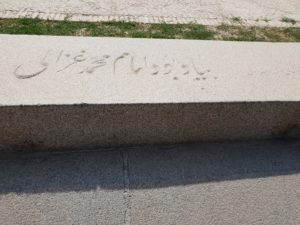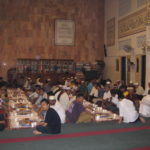Great minds and their works have been known to be lost to the mists of time, whether by intent or accident. Perhaps they were buried in a natural disaster, such as Pompeii, or destroyed via conquests, such as the Conquistadors in the Americas or the burning of the great Library of Alexandria many centuries past. Still yet, works can disappear through unscrupulous plagiarism, when ones’ failure to give due credit or documentation can obscure her true origins. In the twelfth and thirteenth centuries, Europe was in the early throes of emergence from millennia of forgotten knowledge and ignorance ignited by the fall of the Holy Roman Empire circa 500 C.E. and only ended at the age of the renaissance around the turn of the fifteenth century. Early medieval scholarship in Europe was literally restricted to the clergy (to promote Catholicism), and perhaps the noble class, but forbidden to the laity. In contrast, at the nadir of European knowledge and technology in the West was Islamic scholarship at her apogee in the East.
Centuries deep of rationality and empirical reasoning promoted by Islamic scholars and Imams and in concordance with Qur’anic teaching included, “…new ideas supported by incontrovertible proofs of evidence or logic…” and very much at odds with official Catholic Church doctrine (Medieval Sciences 3). Western isolation from advanced knowledge began to erode with the Muslim conquest of Spain in the eleventh century. In the wake of victory followed the Islamic civilizing effect. With her, she brought advanced knowledge of economics, astronomy, physics, arithmetic, medicine, etal. Indeed, the Western world was stunned into silence by their own vast inferiority to the supposed barbarianism of the Moors, and her own ignorance exposed. Wisely, however, Western scholars increasingly disillusioned with the Roman Catholic Church meticulously translated Arabic works into Latin, particularly after the ouster of the Moors from Spain and would spur a rebirth or renaissance in the West (5). From the Arabs, the Western scholarship would inherit rational deduction and secular thinking later adopted by such giants as Thomas Aquinas (theology and early economic thought). With this brief background of the transfer of knowledge from East to West, we turn our attention to a specific aspect of Islamic thought, economics.
From whom did Aquinas and other early thinkers derive their theories and influences?
Predominantly from a man named Abu Hamid Al-Ghazali. Al-Ghazali was born in 1058 C.E. in the town of Tus located in modern-day Iran at the height of Islamic learning and development. Although orphaned at a young age and without substantial means of support, the incessant yearning to learn impelled him into a lifetime of academic and spiritual inquiry. By his early thirties, he had been appointed head of the Nizamiyyah College at Baghdad and was reputed for his ebullience on Islamic jurisprudence (Al-Ghazali 1,2). An astute author of numerous writings and treatise, his tome Ihya Ulum al-Din (The Revival of the Religious Science) is the apex of Islamic Scholastic thought. Much akin to his other works, Ihya Ulum al-Din effuses socio-economic facts some have labeled the “The Islamic Social Welfare Function” (Medieval Islamic 25). This function is one that encompasses all of one’s activities, economics included, and can be divided into two halves, Maslih (Utility) and Mafasid(Disutility). In modern terminology, one would define these terms as “good and desirable” and “bad and undesirable.” But in the stricter interpretation of the Islamic Scholastics, the terms more precise meaning is “what is exhorted” and “what is prohibited” (Medieval Islamic 51). Al-Ghazali also stresses social welfare which is based on five primary goals: religion, life or soul, family or progeny, property or wealth, and intellect or reason (25). One is to seek the good life, for this is divine providence. However, the work for the common good is predicated on the preservation of the five stated goals, but the pursuit of economic activities is imperative to one’s salvation (26). Thus, he is considered one of medieval Islam’s greatest thinkers, ranging from philosophy to theology and his economic thoughts are evident and clearly relevant today.
Al-Ghazali and the Islamic scholastics
Al-Ghazali and the Islamic scholastics were similar to the scholastics of Europe. To each, the study of economics was inconceivable as a separate field, but was integrated into all aspects of life, or “…merely an appendage to philosophy, ethics, and jurisprudence” (Ghazanfar, 858). Thus, economics was not analyzed in the modern sense, such as capital accumulation spurs economic growth or supply creates its own demand, to name a couple. As specified above, the Scholastics were more concerned with economics from a moral perspective in congruence with their, “…larger concern for the common good and social justice” (Ghazanfar 859). Indeed, one’s behavior obligated scriptural preeminence to guide one’s action in the markets of exchange and pursuit of material gain for its own sake was verboten. Thus in modern terms, Al-Ghazali and other Scholastics were primarily concerned with normative economics and much less reliant on positive economics.
Al-Ghazali’s Economic Thought
Al-Ghazali’s economic thought ranged from production activities to the evolution of money to public finances. His writing is remarkably modern in the obvious reference to supply and demand, international trade, business collusion, and even comparative advantage. Collectively, these brilliant writings reflect a foundation even a casual reader could recognize. However, these ideals are all for not without the ability of businessmen and merchants to conceptionalize their transferability to every day life. Al-Ghazali provides the mechanism for implementation with his assessment of the operations of market system-The Voluntary Exchange and Evolution of Markets
(Economics of Al-Ghazali 17).
Whether Adam Smith or David Ricardo was familiar with Al-Ghazali’s theories of markets may be an open question. Certainly each man would recognize Al-Ghazali’s concept of international trade. He asserted that markets arose due to economic need and trade would satisfy these needs more efficiently than merely self-reliance. The man became cognizant that by giving up something in his possession for trade, perhaps an excess supply of some commodity, he could gain from another individual who likewise wished trade his excess commodity, and mutual needs could be rendered satisfied. One can easily recognize this trade operation as the barter system. However, even Al-Ghazali noted that the bartering system, while an improvement over pure self-reliance, was still ipso factoan inefficient method of trade. For his evidentiary means, he gives the example of the farmer and the carpenter. Perhaps the carpenter has need of food of which the farmer can bountifully supply. But if the farmer has no need of tools, he is without incentive or need to trade. Conversely, if the carpenter has no need of food, he will not trade with the farmer. Thus, mutual needs will not be satisfied as the carpenter will need to locate another farmer who is in need of tools if he desires to trade for food. Therefore, over time circumstances will dictate a community to develop a central market or trading arena where goods and wares can be traded or more likely bought or sold for a profit (18). Mutual needs are satisfied and everyone is better off. The buyer saves time in locating a seller or trader and the merchant of goods or wares will sell his excess supply in a timely manner with a profit to boot.
 The success of a central market in one locality will inevitably spread to other regions and countries, creating trade zones across spheres. The benefits of trade are manifold. As more goods and wares become available, greater variety and tastes can be met, increasing consumer utility. In addition, the availability of goods and wares at ever greater distances will necessarily create a new sector in transportation services, and in turn create a far more efficient class, the merchant trader. Long, arduous distances and the accompanying financial hardships, as well as familial obligations that will likely incur, obfuscate the average ordinary citizen ability to travel to the far away, but burgeoning urban trade centers. Thus the lure of profit will persuade the merchant trader to assume the risk inherent in such endeavors and consumer needs and demands will be met for a price (18).
The success of a central market in one locality will inevitably spread to other regions and countries, creating trade zones across spheres. The benefits of trade are manifold. As more goods and wares become available, greater variety and tastes can be met, increasing consumer utility. In addition, the availability of goods and wares at ever greater distances will necessarily create a new sector in transportation services, and in turn create a far more efficient class, the merchant trader. Long, arduous distances and the accompanying financial hardships, as well as familial obligations that will likely incur, obfuscate the average ordinary citizen ability to travel to the far away, but burgeoning urban trade centers. Thus the lure of profit will persuade the merchant trader to assume the risk inherent in such endeavors and consumer needs and demands will be met for a price (18).
Although Al-Ghazali espouses international trade, division of labor, and recognizes the role of supply and demand in market transactions, it is the role of profits that can lead to exploitation on those least able to pay. With the necessities of life, particularly food, profit should not be a preeminent concern for the trader, and foodstuff items should be sold at a low price. Now what exactly a low price designates, Al-Ghazali does not elaborate. Perhaps by a low price he means to sell necessary essentials at a wholesale price or a break-even price. Of course, this can lead to undermining the law of supply, which would evidence itself in lower qualities of foodstuff and other discount necessities. Along with his condemnation of collusion, “…secret dealings and price manipulations on the part of buyer and sellers,” one subjecting themselves to the wrath of Allah and punishment is forthwith in the hereafter for such malevolent behavior (22).
While Al-Ghazali was virtually unknown in the West until recent decades, this is not the case with Thomas Aquanis (1225-1274). Aquanis is regarded as par excellence and resides at the apex of Western Scholastic thought. His age witnessed the early rise in Europe of science, observation, and empirical reasoning to explain world phenomena. Much akin to Islamic Scholasticism, Aquanis jurisprudence allotted scriptural pre-eminence, with divine guidance the overarching thesis, “…that all behavior, including economic activities, is teleological” (Ghazanfar 858). But how original were Aquanis’ ideas or literature? It is well known that many of the European Scholastics, Aquanis included, spoke Arabic, the dominant language and culture of the era, and Aquanis, “…made a study of the Arabic writers and admitted his indebtedness to them” (864).
Despite their difference in religious belief, their teleological aspirations paralleled. Each allotted deference and tolerance to opposing views, and both sought to illuminate through reason the state of their faith. But for Aquanis and Al-Ghazali, the vanguard of personal conviction attested the supremacy of faith over reason, although the harmony of the two is essential (863). However, Aquanis’ tolerance to opposing views, particularly those of secular origin, had its limits. Though his admiration of Al-Ghazali is unassailable, his fear of Arabic “scientific rationalism” of the Aristotelian school, especially that espoused by Ibn Sina (Averroes), propelled him to his most famous treatise Summa Theologica with papal sanction (867).
Great fear was expressed by Western Scholastics that secularization, as presented by Averroes, was a threat to the institution of Christianity itself and the treatise’ purported intent was to expose the “diabolical” modus operandi of elevating reason over faith. But again, one is presumed to ask the burning question: was Summa Theologicaan original work? The conclusive evidence is no. As stated earlier, Aquanis was explicit in professing his indebtedness to Al-Ghazali, and nowhere was this evidence more clear than in economic matters. Studiously assiduous in citing his work, he never the less “creates” his tome as an inexact duplicate of Ihya Ulum Al-Din. From admonishing one against knowingly selling of one’s wares at an unjust price (over valued), to the poor quality of the wares, to his scriptural dependant dictation of restitution to the cheated buyer, “…even if a defect in a good has occurred after the seller acquired it, the buyer must be informed…” (871-873).
Not only does Aquanis mimic Al-Ghazali on cheating, but he does likewise on the subject of usury (interest). Each man asserts that money is created solely for the purpose of exchange, and to exact usury in lending agreements is extortion and a sin in the eyes of the creator. Therefore, one is duty-bound to recompense the ill-gotten gains to the borrower (874-875).
Even their complicit views are extended to the realm of private property, albeit with a variance of emphasis. Aquanis, akin to Al-Ghazali, propagated one’s private property rights as an incentive to positive, stimulative economic activity, through the rewarding of man for the fruits of his labor. However, Aquanis attributes availing private property as best due to experience. On the other hand, Al-Ghazali fosters the notion of natural law and that all resources ultimate belong to God (879).
Conclusion
In conclusion, one need not attest that Aquanis was not the author of any original work, for that is not the objective with this comparison. No, the purpose here was to communicate the undeniable influence upon Western economic thought vastly elucidated via Al-Ghazali. Centuries before David Ricardo, Al-Ghazali related the efficiency of trade as mutually beneficial between individuals as well as between nations, and one roundly superior to the bartering system. Furthermore, he anticipated Adam Smith with his notion of the division of labor and the creation of the merchant class, one that assumes the risks to life and limb for the gain of profit and readily renders a service to the consumer. He even anticipates Marx in that his exhortations rail against the exploitation of those least able to pay whether they are perpetrated by indifference, deceit, or greed. One could conceivably contend that without Al-Ghazali, Western economic thought may have eventually found her way on her own through trial and error, or one could contend that she may have floundered for centuries backward, barbaric, and ignorant. Without the benefit of a parallel universe, one can only venture to guess. What is unassailably certain, however, is that without the economic works of Al-Ghazali’s (and other Arabs) translation into Latin and the European Scholastics feverish undertaking in their care, the great economic minds of Western thought would have been irrelevant simply because they would never have existed (the works, not the individuals). Without the rational deduction and secular thinking adopted by the European Scholastic’s during the medieval era via the Islamic Scholastics, the Western world of economics as we know it today is simply unimaginable. Thanks to Al-Ghazali, the notion is moot.
Works Cited:
Al-Ghazali, Abu Hamid (1058-1111). Kojiro Nakamura. 13 Sept. 2005. 28 Jan. 2007.
Ghazanfar, S. Mohammad and Abdul Azim Islahi. Economic Thought of Al-Ghazali.
(450-505 A.H./1058-1111 A.D.). Jeddah, Saudi Arabia: Scientific Publishing
Center, ?. 8 Oct. 1997. King Abdulaziz University.
Ghazanfar, S. M. ed. Medieval Islamic Economic Thought: Filling the “Great Gap” in
European Economics. London: Routledge Curzon, 2003
S. M. Ghazanfar. “The Economic Thought of Abu Hamid Al-Ghazali and St. Thomas
Aquanis: Some Comparative Parallels and Links.” History of Political Economy.
32 (2000): 858-883.
The Islamic Foundations of the Renaissance. Hugh Bibbs. 1999. 17 Feb. 2007.






